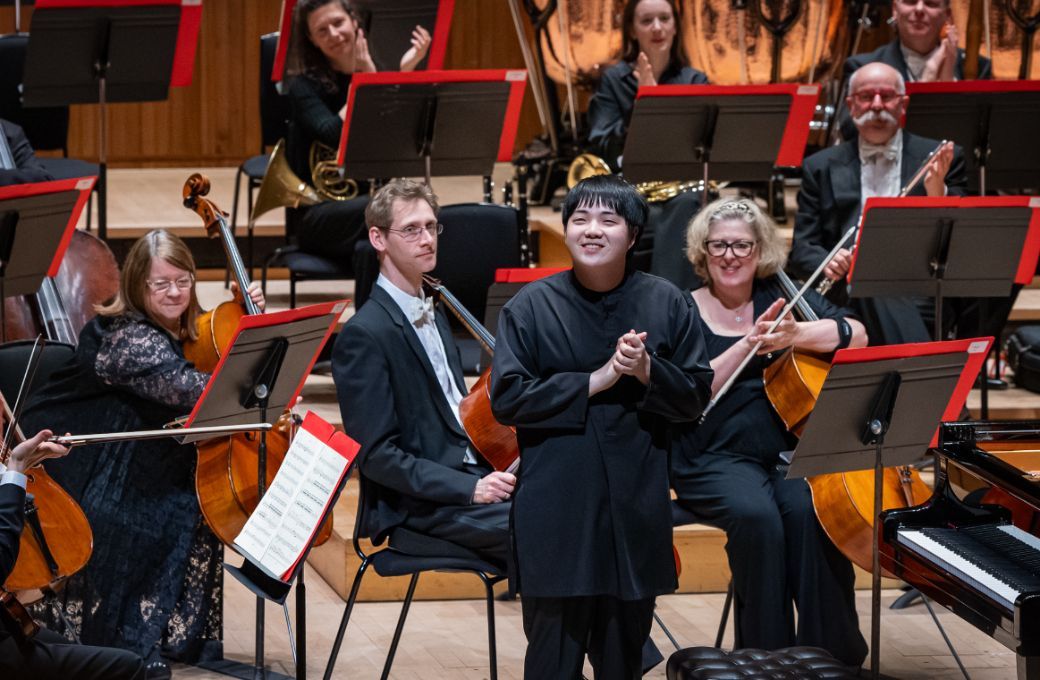Is there a more movingly consummate Mozart pianist performing today than Mao Fujita? On the strength of his performance of Piano Concerto no. 25 in C major with Osmo Vänskä and the Philharmonia Orchestra – the second of Fujita’s two Mozart concertos with the orchestra – I’d say not.

Fujita’s affinity for Mozart is hardly news. It was with Mozart’s K491 that in 2017 he won the Concours International de Clara Haskil, and recently he performed Mozart’s complete piano sonatas at Wigmore Hall, the Verbier Festival and around Japan, recording them for Sony. Still, sitting in the Royal Festival Hall on Thursday, it was impossible not to be entranced and fascinated afresh.
The magic was working long before the 26-year-old even played a note, his face looked so raptly, radiantly engaged and in love with each and every nobly springing note from Vänskä and the musicians. Then his entry: whimsically improvisatory-sounding and silky-smooth; pearly, precisely defined articulation; and sounding miraculously gracefully, airily unfettered to an instrument of wood, iron, hammers and steel. What really marked Fujita’s expressive, deftly shaped Mozart as subtly head-and-shoulders above even the greatest of the rest of the piano pack, though, was the sensation of Mozart’s music finally set free into sounding as the notes on the page suggest, but which never really completely happens. Completely pure, radiant and untainted by human messiness. Absolute music. Innocent music, albeit of an old-soul emotional intelligence.
That’s a lot of adjectives, but one sensed that Vänskä and the orchestra felt it too; they also looked so joyously spellbound and inspired in their own multi-nuanced warmth, majesty, lightness, glow and dance. Equally delicious in this context was that Fujita’s own cadenza – written in February but receiving its first concert outing here – was a thoroughly original one, moving from Bach-like fugal writing despatched à la Rachmaninov, through a Big Band swing, to dreamy minor-keyed section, until late Romanticism collided with cocktail lounge before a glittering full-throttle climax into the recapitulation. Fabulous. His encore served up more C major in the form of the first movement of Mozart’s Piano Sonata no. 16 in C major, rattled off with gossamer-delicate, nonchalantly rippling speed, with a laughter-raising deliberate discord snuck into its penultimate chord.
Vänskä’s programme fitted around this otherworldly-worldly centrepiece like a glove. Opening the concert, Missy Mazzoli’s These Worlds in Us – premiered in 2006, its title drawn from the James Tate poem The Lost Pilot meditating on his father’s death in World War 2, and dedicated to Mazzoli’s own father who was a soldier in Vietnam – was a wistful, vitally pulsing dreamscape, Vänskä both a steady rhythmic hand on the tiller of its collision of Balinese and march-like beats, and a physically, expressively fluid one, jigging to a big band swing one moment, and simply precisely ticking hand gestures the next.
Then finally, Mendelssohn’s Reformation Symphony. Warmly majestic, with exciting rhythmic and dynamic handling – in the opening phrases alone, there was the dynamism and definition of the hairpin brass swells, and the extremity of the contrast between their forte and the strings’ hair’s-breath pianissimo –; a nobly blithe, momentum-filled pastoral party of a Scherzo; a gliding Andante with a tremendous final crescendo, then the finale with its rousing Lutheran hymn tune pulling our ears to admire Mendelssohn’s Bach-inspired polyphony and the coloristic interplay between sections. The onstage warmth was palpable too. To tumultuous applause, it was touching to watch the delighted Vänskä shake the hands of each section leader in turn, complete with air-handshake to the unreachable double basses. Onstage or offstage, a perfect night.


